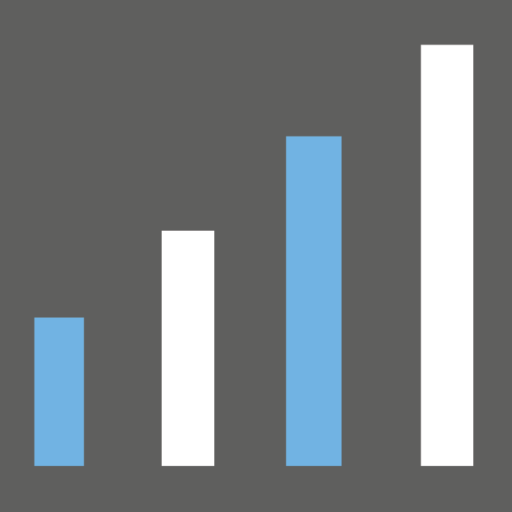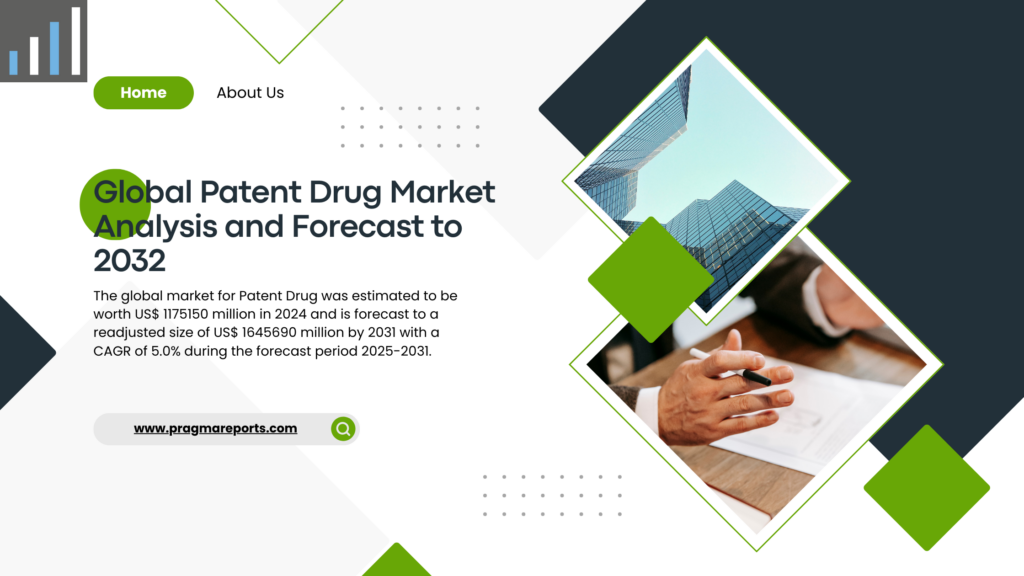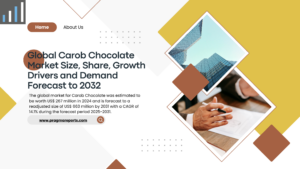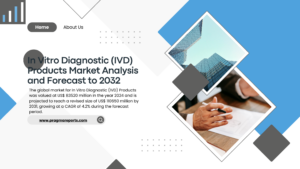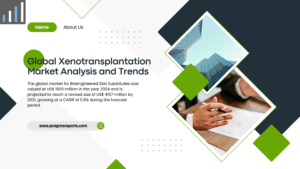Table of Contents
- Market Overview
- Market Size and Growth
- Key Players in the Patent Drug Market
- Market Segmentation by Region
- Market Segmentation by Type
- Market Segmentation by Application
- Growth Drivers of the Patent Drug Market
- Trends and Opportunities
- Competitive Analysis
- Revenue Insights
- Demand Forecast to 2032
- Related Reports
- FAQ
Market Overview
The global Patent Drug Market is a vital segment within the pharmaceutical industry. It focuses on drugs protected by patents, granting exclusivity to the developing company.
This exclusivity period enables companies to recover research and development costs and generate profits before generic alternatives emerge. Patent drugs often represent innovative treatments across various therapeutic areas like oncology, cardiology, and neurology.
Market dynamics are driven by factors such as the increasing incidence of chronic diseases, advancements in drug development, and the demand for novel treatments. Regulatory policies and healthcare infrastructure also significantly influence the market.
The pharmaceutical industry relies on patent protection to encourage innovation and investment in new drug development. Patents safeguard intellectual property, motivating companies to invest in costly research and clinical trials.
Without this protection, the financial risks would be too great, potentially hindering innovation and limiting access to new treatments. The Patent Drug Market is marked by intense competition as companies strive to develop and market groundbreaking drugs with clinical advantages.
Pharmaceutical companies invest heavily in R&D, utilizing technologies like genomics and proteomics to identify new drug targets. A drug’s success depends on its efficacy, safety, ability to address unmet needs, and differentiation from existing treatments.
Stringent regulatory oversight by agencies such as the FDA and EMA ensures the safety and quality of patent drugs. Approval processes involve extensive trials to evaluate benefits and risks. Regulatory policies also impact pricing and market access.
As the global population ages and chronic diseases increase, the Patent Drug Market is expected to remain a dynamic and crucial part of the healthcare sector. Consider the potential overlap with related health trends, such as the increasing interest in alternative health solutions, evidenced by markets like the Mushroom Coffee Market.
Market Size and Growth
The global Patent Drug Market has shown substantial growth and is projected to continue its upward trend.
The market was valued at approximately US$ 1175150 million in 2024. Forecasts indicate a rise to US$ 1645690 million by 2031, representing a CAGR of 5.0% from 2025 to 2031.
Growth is driven by increasing healthcare expenditure, an aging population, and a rising prevalence of chronic diseases. Advancements in drug discovery also play a significant role.
The pharmaceutical industry’s investment in R&D is a key growth factor. Companies develop innovative drugs to address unmet medical needs.
Patent protection provides market exclusivity, allowing companies to recoup investments. This incentivizes further innovation. However, the market faces challenges such as high development costs and stringent regulations.
Despite these challenges, the outlook remains positive due to the pursuit of medical advancements and the demand for effective treatments.
North America currently holds a significant market share due to its advanced healthcare infrastructure. The Asia Pacific region is expected to exhibit the fastest growth. This growth is attributed to a large population and increasing healthcare awareness.
China and India are emerging as key markets. Understanding these dynamics is crucial for companies seeking to capitalize on opportunities. Consider also the growing market for related products like Reef Safe Sunscreen.
Key Players in the Patent Drug Market
The global Patent Drug Market is defined by major companies that influence industry dynamics.
These are typically large pharmaceutical firms with significant R&D capabilities and a wide global presence.
Some of the leading companies include:
| Company | Key Focus Areas |
|---|---|
| Pfizer | Cardiovascular, Oncology |
| Roche | Oncology, Immunology |
| Sanofi | Diabetes, Cardiovascular |
| Johnson & Johnson | Immunology, Oncology |
| Merck & Co. (MSD) | Oncology, Infectious Diseases |
| Novartis | Cardiovascular, Oncology |
| AbbVie | Immunology, Oncology |
These firms heavily invest in R&D to discover and commercialize new drugs, targeting therapeutic areas like oncology and cardiology. They also engage in strategic collaborations to expand their product offerings and market presence.
Competition is intense, with firms constantly competing for market share through product innovation and effective marketing. Success depends on navigating regulatory complexities and addressing patient needs.
In addition to larger companies, smaller biotech firms focus on niche therapies. These companies often rely on venture capital and partnerships with larger firms. These smaller players contribute to innovation and offer opportunities for larger companies to expand their portfolios. Keep an eye on emerging fields, like the Bioengineered Skin Substitutes Market, for potential future therapeutic targets.
Market Segmentation by Region
The global Patent Drug Market is divided into regions, each with distinct characteristics.
Key regions include:
- North America (U.S., Canada, Mexico)
- Europe (Germany, France, UK, Italy, etc.)
- Asia Pacific (China, Japan, South Korea, India, etc.)
- South America (Brazil, etc.)
- Middle East and Africa (Turkey, GCC Countries, Africa, etc.)
North America holds the largest market share due to high healthcare spending and infrastructure.
Europe is the second-largest market, with Germany, France, and the UK leading the way. The Asia Pacific region is expected to grow the fastest due to a large population and rising healthcare awareness.
| Region | Key Drivers |
|---|---|
| North America | High healthcare expenditure, strong pharmaceutical presence |
| Europe | Well-established healthcare, aging population |
| Asia Pacific | Large population, increasing healthcare access |
South America’s market is smaller but expected to grow steadily. The Middle East and Africa region is also projected to witness growth.
Understanding regional dynamics is vital for companies seeking to expand globally. Companies need to tailor strategies to each region. For instance, explore technological synergies with markets such as the AI Power Supply Market to enhance drug development and delivery systems.
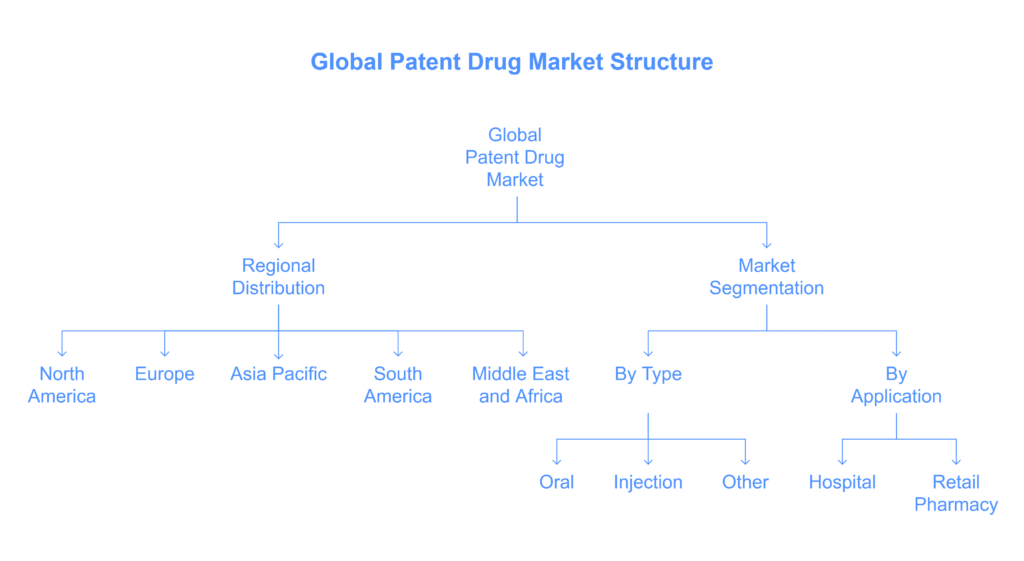
Market Segmentation by Type
The global Patent Drug Market can be segmented by drug administration type.
The primary types are:
- Oral
- Injection
- Other
Oral drugs are the most common, offering convenience and cost-effectiveness.
Injection drugs are significant for drugs that cannot be administered orally.
| Type | Advantages |
|---|---|
| Oral | Convenient, cost-effective |
| Injection | Effective for certain drugs, rapid absorption |
| Other | Targeted delivery, rapid absorption |
The “Other” segment includes topical, transdermal, and inhalation routes. Choice of route depends on the drug’s properties and patient needs. Innovations in drug delivery technologies are expected to drive market growth.
Pharmaceutical companies continuously develop new methods to improve efficacy and safety.
Market Segmentation by Application
The global Patent Drug Market is segmented by end-users.
The primary applications are:
- Hospitals
- Retail Pharmacies
Hospitals are a major segment, serving as primary care providers.
Retail pharmacies provide access to medications for outpatients.
| Application | Role |
|---|---|
| Hospitals | Acute and chronic medical treatments |
| Retail Pharmacies | Medication dispensing, patient counseling |
The hospital and retail pharmacy segments are interconnected, as hospitals discharge patients with prescriptions to be filled at retail pharmacies. Pharmaceutical companies collaborate with both to ensure drug availability.
Growth in both segments is expected to be driven by the demand for effective treatments and improving healthcare access.
Growth Drivers of the Patent Drug Market
The global Patent Drug Market is driven by numerous factors.
Key growth drivers include:
- Increasing prevalence of chronic diseases
- Advancements in drug discovery
- Growing geriatric population
- Increasing healthcare expenditure
The rising incidence of conditions like diabetes and cardiovascular diseases fuels demand.
Technological breakthroughs enable the development of more effective therapies.
| Driver | Impact |
|---|---|
| Chronic Diseases | Increased demand for treatments |
| Drug Discovery | Development of innovative therapies |
| Geriatric Population | Higher medication needs |
The increasing healthcare expenditure improves access to medications. Government initiatives also play a role. Consider how related markets, such as the Xenotransplantation Market, could eventually influence treatment strategies and demand within the Patent Drug Market.
Trends and Opportunities
The global Patent Drug Market is influenced by key trends.
Notable trends and opportunities include:
- Focus on personalized medicine
- Rise of biosimilars
- Adoption of digital health technologies
- Emerging market growth
Personalized medicine tailors treatments to individual characteristics.
Biosimilars offer more affordable alternatives to biologic drugs.
| Trend | Opportunity |
|---|---|
| Personalized Medicine | Development of targeted therapies |
| Biosimilars | Affordable treatment options |
| Digital Health | Improved monitoring and data collection |
Digital health technologies enable remote monitoring. Emerging markets present significant opportunities for expansion. Also, explore the potential of aligning with markets such as the AI Power Supply Market for optimizing power consumption in healthcare facilities, thus indirectly supporting sustainable healthcare practices.
Competitive Analysis
The global Patent Drug Market is highly competitive.
Competition is driven by factors such as product innovation and pricing.
| Factor | Impact |
|---|---|
| Product Innovation | Market share and revenue generation |
| Pricing Strategies | Market access and profitability |
| Regulatory Approvals | Market entry and commercialization |
Key players use strategies such as R&D investments and strategic alliances to gain an edge. Competitive analysis involves assessing strengths and weaknesses of key players.
Revenue Insights
The global Patent Drug Market generates substantial revenues.
Revenue is influenced by drug pricing and market access.
| Factor | Influence |
|---|---|
| Drug Pricing | Revenue per unit sold |
| Market Access | Number of units sold |
| Product Mix | Overall revenue generation |
Revenue insights vary by region and therapeutic area. Companies need to monitor revenue trends.
Demand Forecast to 2032
Demand for Patent Drugs is expected to grow steadily through 2032.
Demand is driven by aging populations and chronic diseases.
| Driver | Impact on Demand |
|---|---|
| Aging Population | Increased need for treatments |
| Chronic Diseases | Higher demand for medications |
| Economic Growth | Improved access to healthcare |
Advancements in medical science will further fuel adoption. Pricing pressures and regulations will influence demand.
FAQ
What is the current size of the global Patent Drug Market?
The global Patent Drug Market was estimated to be worth US$ 1175150 million in 2024.
What is the projected growth rate of the Patent Drug Market?
The market is forecast to reach a readjusted size of US$ 1645690 million by 2031 with a CAGR of 5.0% during the forecast period 2025-2031.
Who are the key players in the Patent Drug Market?
Some of the key players include Pfizer, Roche, Sanofi, Johnson & Johnson, Merck & Co. (MSD), Novartis, and AbbVie, among others.
What are the main types of patent drugs?
The market is segmented by type into oral drugs, injection drugs, and other forms of administration.
What are the primary applications of patent drugs?
Patent drugs are primarily used in hospitals and retail pharmacies.
